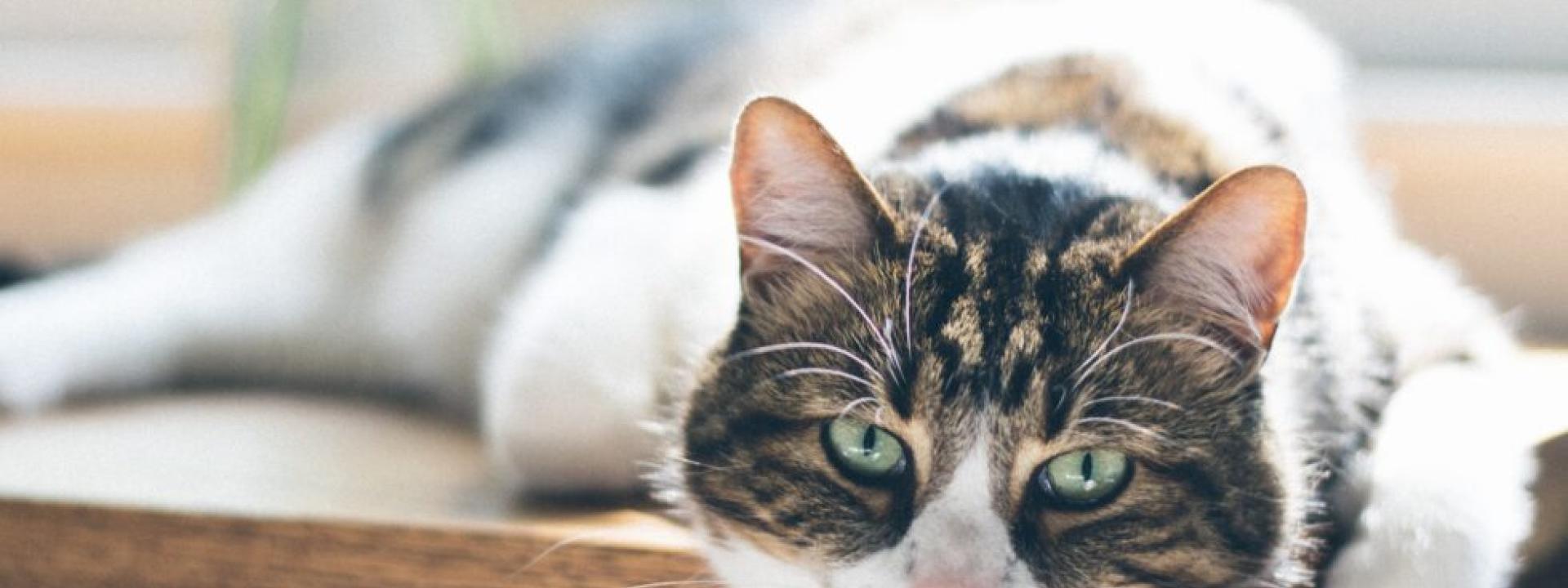Arthritis (also referred to osteoarthritis or degenerative joint disease) is a common but often unrecognized condition in cats. Up to 90% of cats above age 12 have evidence of arthritis on examination. Arthritis refers to inflammation in the joints that causes stiffness and pain, leading to reduced mobility and discomfort. As cats age, the likelihood of developing arthritis increases, and it affects their overall quality of life. Understanding the symptoms, causes, and treatment options is essential to effectively manage arthritis in cats.
Symptoms of Arthritis in Cats:
Recognizing the signs of arthritis in cats is the first step in managing the condition. These are generally subtle, and include:
-
- Stiffness and difficulty jumping onto surfaces or into the litter box
- Limping or favoring certain legs
- Reluctance to move around or play
- Reduced activity levels
- Behavioral changes, such as aggression or avoidance when being petted or touched
- Muscle loss or weakness
- An increase in sleeping, particularly during the day.
Think your cat may be exhibiting any of these signs? Click here for an osteoarthritis checklist provided by Zoetis: Feline Osteoarthritis Checklist | Zoetis Petcare
Causes of Arthritis in Cats:
Several factors contribute to the development of arthritis. These include:
-
- Age: Arthritis is more likely to affect older cats, as their joints naturally experience wear and tear over time.
- Breed: Certain breeds, such as Maine Coons, Dwarfs, Munchkins and Persians, are more susceptible to arthritis.
- Injury: Trauma to the joints, i.e. breaking a pelvis or tearing ligaments of the knee, can contribute to arthritis, especially in young animals.
- Weight: Excess weight puts added pressure on your cat’s joints, leading to inflammation and pain.
- Genetics: Some cats may have a genetic predisposition to arthritis.
Treatment of Arthritis in Cats:
Early recognition of arthritis in cats is critical in preventing further damage to the joints. Treatment for arthritis involves both medical management and lifestyle changes. These include:
-
- Diet: A healthy, balanced diet, and weight management plan can reduce the pressure on the joints in obese cats.
- Exercise: Controlled exercise such as regular play sessions and gentle stretching can keep muscles and joints supple and reduce stiffness.
- Modifying the environment: Provide low-sided, covered litter boxes and ramp access to elevated areas to reduce the risk of injury.
- Medications: Nonsteroidal anti-inflammatory drugs (NSAIDs) and other painkillers can provide pain relief and reduce inflammation. These have to be used with caution in cats – bloodwork is often required for long term use.
- Joint supplements: Supplements such as glucosamine and chondroitin may help strengthen the joints (we like Vetriscience Glycoflex.) Injectable supplements, like Chondroprotec are also helpful in maintaining joint health and lubrication.
- Solensia ™ : A new injectable arthritis medication. This is a once-monthly injectable feline antibody that targets Neuronal Growth Factor in joints, which helps reduce both the pain and the inflammation from arthritis.
Prevention of Arthritis in Cats:
While some factors that lead to arthritis in cats cannot be prevented, there are some measures you can take to reduce the likelihood of arthritis developing. These include:
-
- Regular veterinary examinations to identify early signs of arthritis.
- Weight management, avoiding overfeeding.
- Providing your cat with a comfortable and supportive bed or cushion for rest.
- Limiting or avoiding jumping on and off high surfaces.
- Engaging in regular low-impact exercise to help your cat maintain mobility.
Arthritis is a common (and commonly underdiagnosed) disease. If you are noticing your senior cat just isn’t as spry as he used to be, please contact us. We can help!
Citations:
Lundgren, DVM, B. (n.d.). Arthritis in dogs and cats: What can be done?. VIN.
https://veterinarypartner.vin.com/default.aspx?pid=19239&id=8896028

